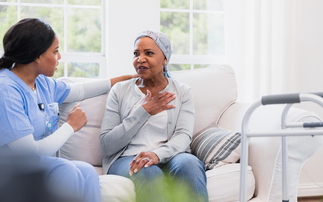Almost a third of people who have been treated for cancer say they felt pressure to ‘bounce back to normal' more quickly than they would have liked, Bupa has said.
As a result the insurer has launched a free e-book Living With and Beyond Cancer, aiming to support patients, as well as their family and friends.
Bupa also carried out reserach which found just over a quarter (26%) of cancer patients say more information about what to expect would have helped to support them after treatment.
While half of those surveyed (50%) felt relieved after treatment, nearly as many were left fearful that the cancer would return (45%) and over a quarter (27%) said they felt very vulnerable both mentally and physically.
Around one in three (30%) felt they were put under pressure to "bounce back" to normal more quickly than they would have liked after treatment, with a third (33%) left confused about whether the symptoms and feelings they had were ‘normal' or not.
More people admitted they felt emotionally drained (28%) than felt delighted (17%) once their treatment had finished.
Professor Justin Stebbing, professor of Cancer Medicine and Oncology at Imperial College London said: "This research shows that many cancer patients struggle with life after treatment. We know that they often have to deal with lower self-esteem as a result of surgery and the after-effects of chemotherapy, along with other hurdles such as getting back to work or returning to an active social life.
"Contrary to many people's expectations, the challenge of cancer does not automatically end when treatment finishes and people can be taken by surprise by some of the feelings and side effects they experience."
Stebbing said it was important for people to realise that those who had gone through cancer treatment would still require significant "support, time and understanding" from work colleagues and healthcare professionals.
The research also revealed that of the cancer patients who had wanted more support following their treatment, two fifths (41%) said that more information about what to expect after treatment would have helped them.










